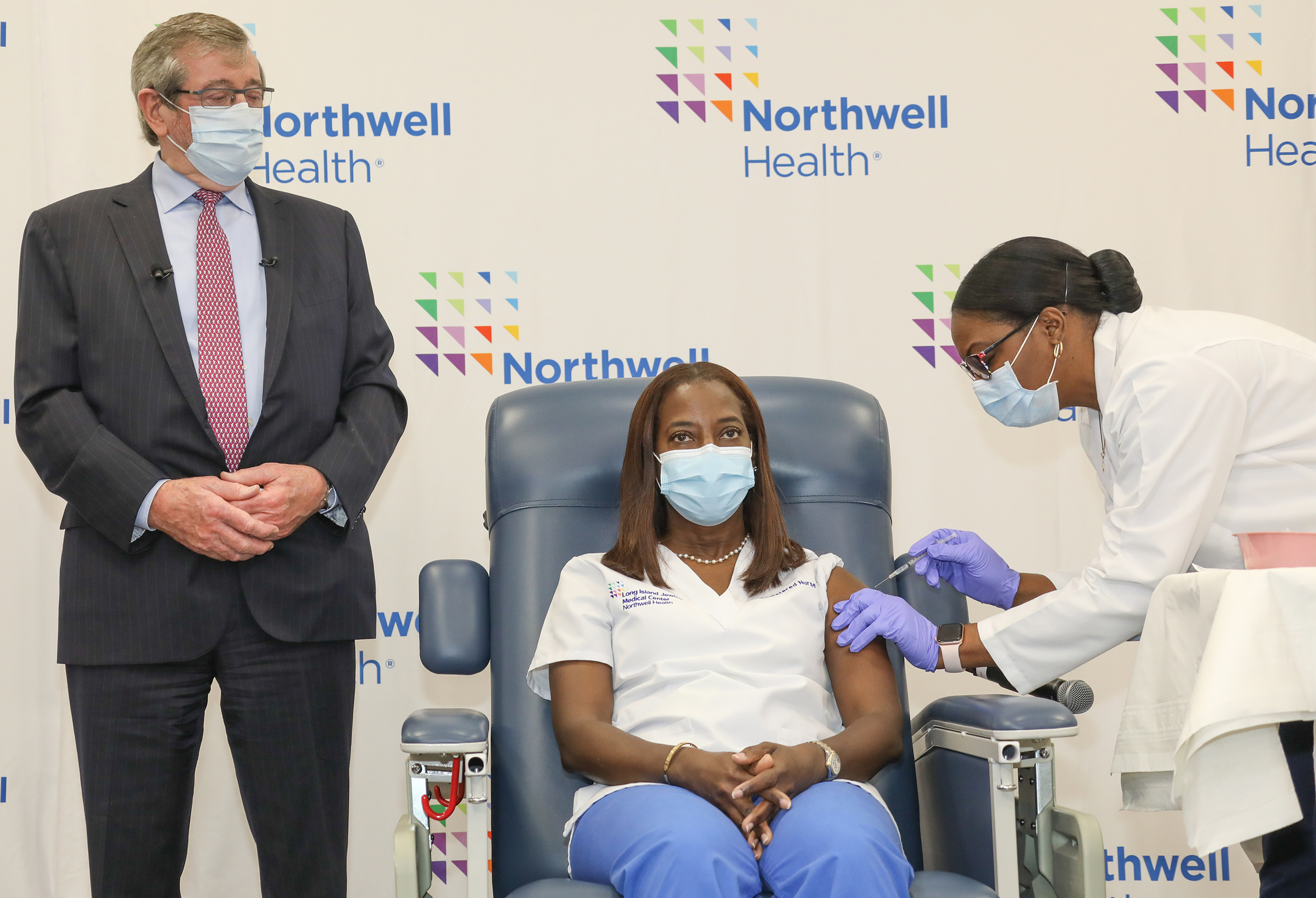Artifacts from the United States’ first COVID-19 vaccination, received by Port Washington resident and Northwell Health nurse manager Sandra Lindsay, will be entered into the Smithsonian Institute’s National Museum of American History, Northwell health announced this week.
Lindsay’s inoculation with the Pfizer vaccine on Dec. 14 at Long Island Jewish Medical Center in New Hyde Park marked the first dose of a COVID-19 vaccine given in the country.
Northwell says that materials documenting the first doses as well as objects related to vaccine distribution and efforts to encourage the vaccination of frontline health care staff were donated, and includes the now empty Pfizer vial that contained the first doses of approved vaccine administered, Lindsay’s original vaccination record card, and her scrubs and employee identification badge worn at the event.
Lindsay, who also serves as director of critical care services at LIJ, was the first person known to receive the vaccine on American soil.
“Having lived through the devastation and suffering created by the virus, I knew I wanted to be part of the solution to put an end to COVID-19,” Lindsay said in a statement. “I hope that when people visit the museum and see all these items that they stop to honor the lives of people who did not make it and remember the loved ones they left behind. I hope it will inspire some discussion and education for future generations.”
“December 14 was a historic moment for all: the day the very first COVID-19 vaccine was administered in the United States,” said Michael Dowling, president and CEO of Northwell Health. “It was our first real sign of hope after so many dark months in the fight against the global pandemic. Northwell was prepared to put shots in arms as soon as the vaccine arrived, not to make history but to protect our frontline workers battling COVID-19 as quickly as possible. But when Sandra Lindsay rolled up her sleeve, we weren’t just showing our team members the safety and efficacy of this groundbreaking vaccine – we were telling the world that our country was beginning a new fight back to normalcy. It was an extraordinary moment, and I thank the Smithsonian for preserving this important milestone.”
In April 2020, the Smithsonian formed a rapid-response collecting task force to address the COVID-19 pandemic and document the scientific and medical events as well as the effects and responses in the areas of business, work, politics and culture.
In addition to materials from Lindsay’s inoculation, the Northwell donation includes additional vials from doses of the Pfizer and Moderna vaccines administered at Northwell, as well as the supplies needed to prepare, inject and track the vaccinations, such as diluent, syringes and vaccination-record cards.
Northwell also donated shipping materials that document the enormous effort required to support vaccine distribution and preserve vaccine potency, such as a specialized vaccine “shipper” that monitors and maintains temperature.
“The urgent need for effective vaccines in the U.S. was met with unprecedented speed and emergency review and approval,” said Anthea M. Hartig, the museum’s Elizabeth MacMillan Director. “These now historic artifacts document not only this remarkable scientific progress but represent the hope offered to millions living through the cascading crises brought forth by COVID-19.”
Northwell’s donation joins the museum’s medicine and science collections that represent nearly all aspects of health and medical practice, will join a forthcoming 3,500-square-foot exhibition, “In Sickness and in Health,” that will explore efforts to contain, control and cure illnesses over the centuries, thereby shaping the nation’s history.
The exhibition will feature artifacts from 19th century vaccination tools and diagnostic instruments to cardiac implants, imaging technologies and objects from the global smallpox eradication campaign and the COVID-19 pandemic.
The museum’s staff also canvassed the nation, asking what it should collect to document this pandemic. The public can continue to make suggestions at inquiry@si.edu and share their Stories of 2020 at a site that will serve as a digital time capsule for future generations. The portal, open through April, will accept stories in English or Spanish and photos or short video.



